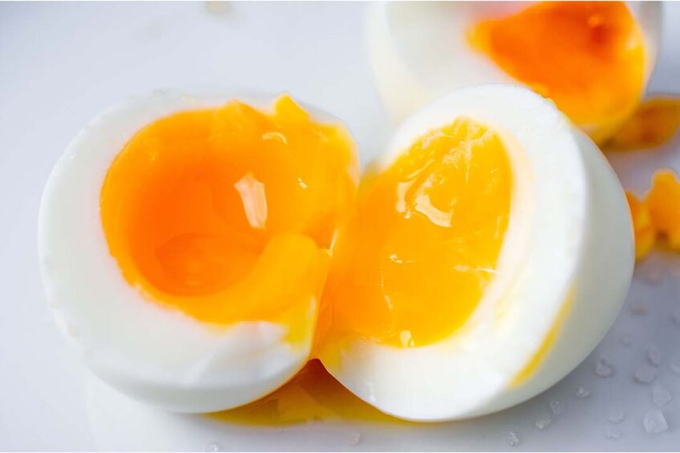November 26, 2025 | 17:11 GMT +7
November 26, 2025 | 17:11 GMT +7
Hotline: 0913.378.918
November 26, 2025 | 17:11 GMT +7
Hotline: 0913.378.918

A diet rich in vitamin D will mean more vitamin D present in the eggs a hen lays. Photo: Canva
Scientists analysed vitamin D-enriched eggs from the Noble Foods branded, Happy Egg Co, to determine how the vitamin’s concentration was affected by different cooking and storage methods, as part of an Innovate UK-funded piece of research.
Vitamin D is known to help keep bones, teeth and muscles healthy, as well as being important for the immune system. But some research also suggests that people with low levels of the vitamin also have a higher risk of developing seasonal affective disorder (SAD), which is particularly prevalent in the winter.
The team compared eggs stored in a fridge to the equivalent of out on the kitchen worktop, and 5 different ways of cooking the eggs – scrambled, microwaved, poached, hard boiled and fried.
Lead author Tom Hill, professor of nutrition at Newcastle University, said the best way of retaining vitamin D in the eggs was to keep them out of the fridge at an ambient temperature. Scrambled and poached eggs retained most of the vitamin.
“We know that more than 90% of the British population is not getting enough dietary vitamin D and there is an urgent need to develop foods that will solve this problem. Our previous studies have shown how we can successfully enrich eggs with vitamin D through the hens’ diet, which could be a valuable food source in helping address the widespread problem of deficiency in the UK,” said Hill.
He added: “Now we know, it’s not only about the diet the hens are fed that can significantly increase the amount of vitamin D in the egg, but the way you cook them that influences how much you are going to be consuming.”
In this latest research, after storing the eggs and cooking them with the method under test, batches of eggs were freeze-dried and analysed for vitamin D and 25-Hydroxyvitamin D. The scientists used true retention to measure the proportion of vitamin D remaining in the cooked food in relation to vitamin D originally present in a given weight of the food before cooking. They found it ranged from 78-109%. This approach allows for different percentage weight losses which occur after cooking caused by water loss, for example.
After being kept at an ambient temperature, such as on the worktop, the best method of cooking eggs to preserve the vitamin D to the least successful were:
Comparing the enriched eggs to normal ones, vitamin D was found to be 22-132% higher, depending on the method of cooking applied.
Hill has been working with Noble Foods and DSM to examine whether feeding hens supplementary vitamin D in their diets translates into enriched eggs. The findings show that with a whole new diet rich in vitamin D, the more vitamin D is present in the eggs the hens lay. Feeding flocks of commercial hens up to 75ug of vitamin D in each kg of feed for 6 weeks improves the total vitamin D content in the eggs by up to 40%.
This has led Noble Foods to adopt the diet for their flocks. The enriched diet of the hens at the Happy Egg Co. means they lay eggs with 28% more vitamin D per 100g than regular eggs. This means that 2 large eggs provide more than 94% of the European daily guideline, which is the benchmark for food labelling in the UK.
Hill added: “The bigger picture here is that we are providing the benefits of working with industry longer term, to develop real-world food solutions, which tackle nutrient deficiencies in the UK population.”
(PW)

(VAN) A new study reveals how the simultaneous effects of ocean acidification, salinity and loss of oxygen are making the world more fragile.

(VAN) Hopes are growing that the creation of the first 3D turkey gut model could be a turning point in the battle against the virulent blackhead disease.

(VAN) Tyson, America’s biggest meat supplier, plans to shutter one of its largest beef processing plants as the industry continues to struggle with low cattle supplies and political pressure from Washington.

(VAN) New FAO study shows how digital solutions are empowering farmers and fishers to prevent losses and build resilient agrifood systems.

(VAN) Brazil's COP30 presidency pushed through a compromise climate deal on Saturday that would boost finance for poor nations coping with global warming but that omitted any mention of the fossil fuels driving it.

(VAN) Poultry farmers in the UK have been warned that they could face one of the worst winters yet for bird flu.

(VAN) Prices of main-crop paddy have risen sharply, with jasmine rice hitting 16,100 baht per tonne — the highest level in years.